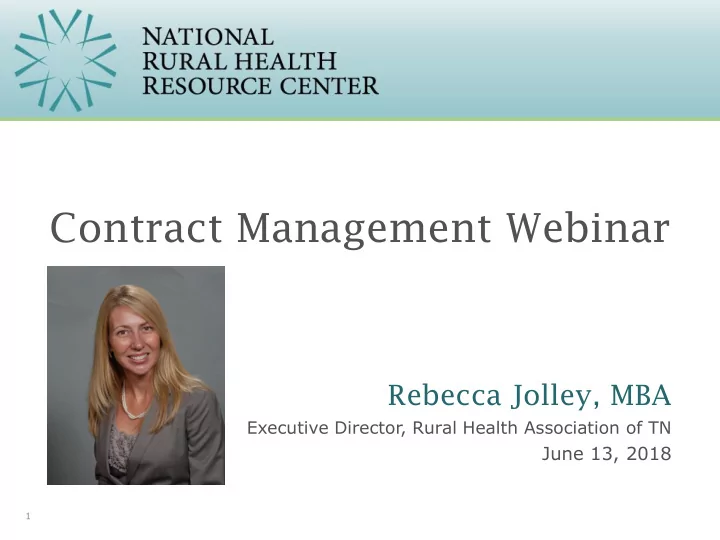

Contract Management Webinar Rebecca Jolley, MBA Executive Director, Rural Health Association of TN June 13, 2018 1
Agenda • Project Life Cycle ◦ Initiation Phase ◦ Planning Phase ◦ Executing Phase ◦ Closing Phase • Group Discussion 2
SHIP Program Background • Target Areas of SHIP Program o Value-Based Purchasing Programs (VBP) o Accountable Care Organizations (ACO) o Payment Bundling (PB) 3
SHIP Program Background • Where is the SHIP Grant “housed” in your state? ◦ Typically in SORH? • SHIP Program enables states to help small hospitals in several ways. A few examples are: ◦ Purchase equipment and/or training to attain value-based purchasing ◦ Join or become accountable care organizations, or create shared savings programs ◦ Purchase health information technology, equipment, and/or training to comply with meaningful use, ICD-10 standards, and payment bundling. 4
Project Life Cycle • 4 Phases of Project Life Cycle Source: http://www.method123.com/project-lifecycle.php 5
Initiation Phase • Project conceptualization process ◦ Outline basic processes to start project ◦ Define what the project is to accomplish • Pre-Grant Award ◦ Scope of activities necessary to execute objectives of grant proposal 6
Initiation Phase • Subcontractor Selection Criteria ◦ Good written and oral communication skills ◦ An established and trusted relationship with rural hospitals ◦ Obtaining references from trusted sources ◦ Clear understanding of project deliverables ◦ Availability to perform work load within grant time constraints ◦ Social media or web based presence ◦ Following states guidelines for subcontractors (if available) 7
Planning Phase • Develop individual subcontracted projects ◦ Define Scope of Work (SOW), Deliverables & Payment for Services ◦ SOW – clearly defined deliverables tied to definitive timeline and completion dates • How does your state SHIP team complete the planning phase work? ◦ RFP process, collaboration with state partners, SORH team input? 8
Planning Phase • Deliverables ◦ Contract execution date (Kick-off) ◦ Major Milestones ◦ Deliverable / Completion Date • Payments ◦ Tied to specific deliverables ◦ Options for withholding payment if deliverables not met - Partial payments; non-payment; termination of agreement 9
Planning Phase • Data Sharing ◦ Medicare Beneficiary Quality Improvement Project (MBQIP) ◦ Data available through state partners - State Hospital Association - State Rural Health Association - Quality Improvement Organization - State Health Information Exchanges ◦ Use of Data Use Agreements / Non- Disclosure Agreements? 10
Execution Phase • Monitor / Manage Work Output ◦ Technical Monitoring - Tracking and reporting progress on key performance indicators & timely completion of deliverables - Engaging Subcontractors and Partners in Demonstrating Outcomes ◦ Financial Monitoring - Revenue Cycle Management - Flex Program Sub-Contract Tracking Spreadsheet (Applicable to SHIP too) 11
Closure Phase • Project Close-Out Process ◦ Submittal of closeout notice ◦ Submission of final deliverables ◦ Submission of final invoices • How does your state address un-met Contract Deliverables? ◦ Deliverable timeline not met ◦ Scope of work not completed ◦ Data/reports not delivered ◦ Failure to provide benchmarking tools or demonstrate outcomes of project 12
Conclusion • SHIP Program is in place to provide resources for SHIP-eligible hospitals to improve the quality of care provided to rural patients ◦ Imperative that the SHIP Program can demonstrate the impact of federal investment on rural communities ◦ Must be able to tell our story ◦ Tracking and demonstrating success through benchmarks & utilization of available data strengthens the overall SHIP Program 13
Rebecca Jolley Executive Director 615-624-0082 Rebecca@RHAT.org Get to know us better: http://www.ruralcenter.org 14
Recommend
More recommend